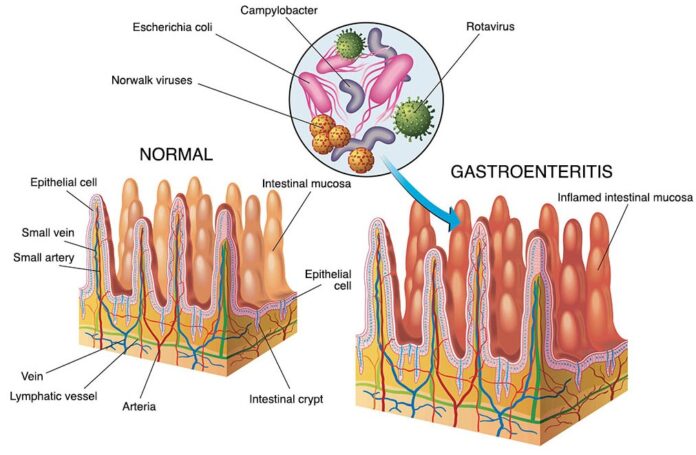In the intricate dance that is health, our bodies sometimes stumble upon an uninvited guest – gastroenteritis. Also known as the dreaded stomach flu, gastroenteritis can swiftly turn a day of normal routine into a whirlwind of discomfort. Imagine feeling nauseous, experiencing relentless stomach cramps, and dealing with bouts of watery diarrhea – quite a trio of unwelcome visitors knocking at your body’s door. But fear not, for understanding these common symptoms and warning signs is like deciphering nature’s code; it empowers you to take charge and navigate through the stormy seas with fortitude.
Recognizing gastroenteritis in its nascent stage is akin to arming yourself with knowledge like a warrior before battle – it puts you leagues ahead in safeguarding your well-being or that of your loved ones. By unraveling the importance of identifying these insidious signals early on, you embark on a journey propelled by awareness and preparedness. As we delve into what sets off those alarm bells within your body, you’ll be equipped not merely with knowledge but with a shield against potential complications lurking around the corner. So let’s unravel the mystery together and chart a course towards better health and resilience.
Key Signs of Gastroenteritis
Gastroenteritis, commonly referred to as the stomach flu, can manifest through a range of distressing symptoms. One of the primary indications of gastroenteritis is the sudden onset of nausea and vomiting. Imagine feeling perfectly fine one moment and then being hit by an overwhelming wave of queasiness followed by an urgent need to vomit. These sudden episodes are often the body’s immediate response to an infection caused by viruses, bacteria, or parasites that have compromised the digestive system.
Another key sign of gastroenteritis is watery diarrhea. This symptom is notorious for its frequency and urgency, disrupting daily routines with multiple trips to the bathroom. The volume and consistency of stool may change as your body works to expel harmful pathogens, leading to dehydration if not managed properly. The hallmark nature of watery diarrhea in gastroenteritis serves as a clear indicator that something is amiss in your gastrointestinal tract.
Individuals experiencing gastroenteritis commonly report abdominal pain and cramps as part of their discomfort. These pains can range from mild discomfort to severe cramping that makes even simple movements excruciating. The abdomen may feel bloated or tender to touch, further adding to the distress caused by this inflammatory condition. Understanding these signs can help differentiate gastroenteritis from other gastrointestinal issues, aiding in prompt recognition and appropriate management strategies.
In summary, recognizing the key signs of gastroenteritis—sudden nausea and vomiting, watery diarrhea, and abdominal pain—is crucial for timely intervention and effective care. While these symptoms can be unpleasant and disruptive, understanding their significance can empower individuals to seek appropriate medical advice or implement self-care measures promptly.
Dehydration Risks
When experiencing gastroenteritis, dehydration becomes a significant concern due to the excessive fluid loss from vomiting and diarrhea. Recognizing the signs of dehydration is crucial in managing this condition effectively. Persistent thirst and a dry mouth are initial indicators that your body is struggling to maintain proper fluid levels. This can result from the continuous expulsion of fluids through vomiting and diarrhea, making it essential to replenish lost fluids promptly.
Reduced urination is another red flag for potential dehydration. Inadequate fluid intake coupled with substantial fluid loss can lead to decreased urine output, indicating that your body is conserving as much water as possible. Monitoring your urine frequency and volume can help you gauge your hydration status during a bout of gastroenteritis. Moreover, dizziness or lightheadedness may manifest as a common consequence of inadequate hydration. When dehydration sets in, blood pressure can drop, causing feelings of light-headedness or even fainting spells.
To mitigate the risks associated with dehydration during gastroenteritis, it’s important to prioritize rehydration efforts. Consuming electrolyte-rich fluids like oral rehydration solutions or sports drinks can help restore the lost minerals and water balance more effectively than plain water alone. Additionally, steering clear of caffeinated or sugary beverages that can exacerbate dehydration is vital in aiding recovery. If symptoms persist despite attempts at self-care, seeking medical attention promptly becomes crucial to prevent complications arising from severe dehydration.

When to Seek Medical Help
While many cases of gastroenteritis can be managed at home with proper rest and hydration, some warning signs indicate the need for medical attention. One key indicator is experiencing a high fever accompanied by chills. The presence of a significant fever may signal a more severe infection that requires medical evaluation and treatment to prevent complications. If you or someone you care for develops a fever along with gastrointestinal symptoms, it’s essential to seek medical help promptly.
Another alarming sign that warrants immediate attention is the presence of blood in stool or vomit. Bloody stools or vomit are red flags that should not be ignored as they can indicate internal bleeding or other serious issues related to gastroenteritis. If you notice blood in your stool or vomit, do not hesitate to contact a healthcare provider or visit an emergency room for assessment and appropriate care.
Extreme weakness and fatigue beyond what is typical for gastroenteritis can also signify complications that require medical evaluation. If you feel excessively weak or fatigued, unable to perform daily activities even after adequate rest and hydration, it may indicate that your body needs additional support. Seeking medical help in such circumstances can ensure proper diagnosis and management of any underlying issues contributing to the persistent weakness.
In summary, if you experience a high fever with chills, observe blood in your stool or vomit, or face extreme weakness and fatigue that does not improve with self-care measures, it is crucial to seek medical assistance promptly. Early intervention can help address any potential complications associated with gastroenteritis and ensure appropriate medical management tailored to your specific condition.
Preventive Measures and Home Care
When dealing with gastroenteritis, maintaining proper hydration is crucial to aid recovery and prevent complications such as dehydration. It is recommended to sip clear fluids like water, herbal teas, or oral rehydration solutions throughout the day. Avoiding caffeinated or sugary beverages that can worsen diarrhea is important. A helpful tip is to keep track of your fluid intake by measuring how much you drink in a day to ensure you are staying adequately hydrated.
During the recovery phase from gastroenteritis, making dietary adjustments can help ease symptoms and support healing. Opt for bland foods like rice, bananas, applesauce, and toast (commonly referred to as the BRAT diet) that are easy on the stomach. Avoid spicy, greasy, or dairy-rich foods that may irritate your digestive system further. Introduce solid foods gradually back into your diet as tolerated, starting with small portions and observing how your body reacts.
Resting is key in aiding recovery from gastroenteritis as it gives your body time to recuperate and fight off the infection. Stay home from work or school to prevent spreading the illness to others. Practicing good hand hygiene, such as washing hands frequently with soap and water, can help reduce the risk of infecting those around you. Disinfecting commonly touched surfaces like doorknobs and countertops can also prevent the spread of gastroenteritis within your household.
By focusing on proper hydration, making smart dietary choices during recovery, and following rest and isolation practices at home, individuals can effectively manage gastroenteritis symptoms and promote a speedier healing process. By taking these preventive measures seriously while caring for oneself or loved ones affected by gastroenteritis, it becomes easier to navigate through this common illness with greater comfort and understanding of what steps contribute to a faster recovery.
Taking Proactive Steps in Identifying and Managing Gastroenteritis
In conclusion, recognizing the key signs of gastroenteritis early is crucial for effective management and recovery. By staying informed about the symptoms and promptly seeking medical help when necessary, individuals can take proactive steps to address this common gastrointestinal infection. Hydration, rest, and appropriate dietary adjustments are essential components of home care that can aid in a speedier recovery from gastroenteritis.
FAQs Section:
1. What are the warning signs of gastroenteritis?
Warning signs include sudden onset nausea, vomiting, diarrhea, abdominal pain or cramps, fever with chills, blood in stool or vomit, extreme weakness or fatigue.
2. What are the hallmark symptoms of gastroenteritis?
The hallmark symptoms include nausea and vomiting, watery diarrhea, abdominal pain or cramps.
3. How do you confirm gastroenteritis?
Diagnosis is typically based on clinical history and physical examination; lab tests may be done to rule out other causes.
4. What are the characteristics of gastroenteritis?
Gastroenteritis is characterized by inflammation of the stomach and intestines leading to symptoms like diarrhea, vomiting, abdominal pain.
By understanding these key aspects of gastroenteritis diagnosis and management, individuals can navigate this common condition with knowledge and confidence. Remember that timely intervention and proper self-care play vital roles in ensuring a smoother recovery process from gastroenteritis.


